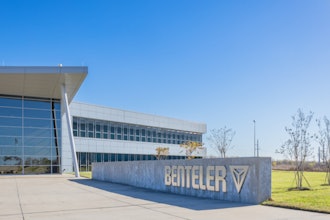DULUTH, Minn. (AP) -- Dave Tyacke watched as, one after the other, all his neighbors moved away.
The paper warehouse, the construction company, the scrap yard, the steel fabricator -- one by one, all these industries left their longtime homes near the Aerial Lift Bridge until Tyacke, owner of the Duluth Spring Co., was the only one left.
And this fall, it finally will be Tyacke's turn to relocate.
In October, he plans to move the last five Duluth Spring Co. employees to the Zenith Spring Co. site on West Michigan Street. The Tyacke family owns both businesses. The move should be completed by November, thus ending the reign of industrial businesses in what is now called Canal Park.
Tyacke's mother, Shirley, remembers when an icehouse and horse-drawn wagons were common sights in the area. Those gave way to the Lyle Brothers Wrecking company and the Sand Bar, which in turn evolved into Grandma's Restaurant, antique stores and rows of upscale hotels and condominiums today.
"It's a good time to evolve out of here," Tyacke said. His family founded and has owned Duluth Spring Co. since 1947.
Duluth hotelier John Goldfine, president of ZMC Hotels, put down earnest money on the property in 2007. Goldfine said ZMC plans to move its corporate offices to the location, at 300 Canal Park Drive.
The spring manufacturer truly has become an island in Canal Park. Tourists and locals fill the Lakewalk just out the company's back door. The narrow concrete-block building is sandwiched between the Hampton Inn and the new Canal Park Lodge. Trucks delivering loads of flat steel must maneuver around the Canal Park clock tower in front of the business.
Tyacke said he knew it was time to go when the Canal Park Inn was demolished in 2006 to make room for the new hotel.
"We're watching a city in transition," Tyacke said. "And I think it's for the better."
The transformation had its roots in a 1950s federal urban renewal project that provided money to clean up blighted areas near what now is called Canal Park Drive, said Jerry Kimball, former head of Duluth's Physical Planning Commission.
In the 1980s, the city began thinking about a different use for the waterfront. Grandma's Saloon and Grill had opened in 1976, and the boat that would become part of the Vista Fleet came along in 1979, laying the groundwork for more tourism.
Kimball fostered a 1983 citywide visioning series which developed two ideas: nurture the city's medical community and "turn our faces towards the water," he said. That led to a plan for making the Canal Park area more attractive and accessible to locals and visitors alike.
Planners didn't want manicured lawns or big franchise businesses, Kimball said. Rather, they sought to build a natural-looking working waterfront with art and as many local businesses as possible.
"We didn't want sloppy industrial buildings, but we didn't mind industrial," Kimball said, drawing a distinction between the former scrapyard and more contained businesses like Duluth Spring Co.
Still, Kimball said, he wasn't surprised that industrial businesses, which had already been leaving the area, continued to move out of Canal Park.
"We figured that would probably happen," Kimball said. "It wasn't necessarily our choice, but that's a pretty natural thing to happen."
Canal Park businessman Bill Meierhoff disagrees with many of the decisions those early planners made, particularly about parking, but he agrees with Kimball about that evolution. Many of the industrial businesses sprouted up in Canal Park because it was the most convenient spot at the time for their owners.
"And as industry matures, it moves to its best location," Meierhoff said.
Meierhoff's family operated pipe bending and steel fabrication businesses in Canal Park, though they gradually sold some of those buildings or converted them to other uses. Meierhoff converted the Falk Paper Co. warehouse at 325 S. Lake Ave into a hotel, several restaurants and the first condominiums in Canal Park. He currently co-owns the Suites at Waterfront Plaza hotel and is the landlord for three Canal Park restaurants.
Meierhoff believes that Canal Park's transformation has been a good thing for the city, having drawn in new places to shop, eat, drink and sleep. But he laments that Duluth has traded those good-paying industrial jobs for lower-wage service sector positions.
"That's just a sign of the times," Meierhoff said. "I'm sad to see (Duluth Spring Co.) go."
Andy Peterson, director of public policy for the Duluth Area Chamber of Commerce, said that moving from Canal Park was a better fit for many industrial businesses.
"A lot of the businesses down there expanded into better spaces," Peterson said. "They were landlocked, and they transferred to areas in West Duluth that were more fitting for them."
The Duluth Spring Co. was close to closing altogether about five years ago, Tyacke said. He kept the company going because he "wanted to keep these good employees."
Today, the two spring manufacturers do more than $2 million in annual sales, and Tyacke is investing $300,000 into the Zenith Spring building to accommodate the Duluth Spring Co. operations. Tyacke said he had had other offers for the Duluth Spring property over the years, but didn't have a compelling enough reason to move.
"We weren't holding out for more money," Tyacke said. But as more and more tourists travel Canal Park Drive, Tyacke has grown more and more worried about one of his forklift operators running into an inline skater or -- ironically -- a horse-drawn carriage.
Tyacke had long thought that the city ought to buy his property; it would make an ideal entry onto the Lakewalk, he said. And although ZMC paid "a happy figure" for the lot, "they're more paying me to move," Tyacke said.
Tyacke believes the entire spring industry is slowly dying as manufacturers replace springs with newer technology. Business also has been pinched as steel and natural gas prices have risen dramatically.
But for now, the companies are keeping busy building springs for everything from Zambonis to golf carts to armored military vehicles.
"Working here is a blast," said Dan Huffman, who has worked at Duluth Spring Co. for 17 years. "It's who you work with, who you work for. We have a good time. I'll miss the old place, but I'm happy there's a new place."






















